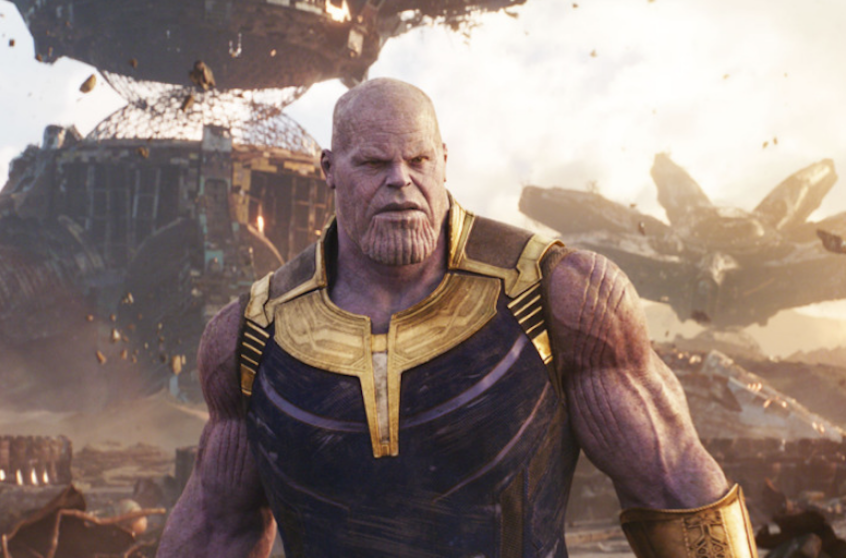Warning: this review contains plot spoilers.
The problem with most movie villains is that they're a bit one-dimensional. The warmongering tyrant who wants to grab power because... it makes him more powerful; the monstrous super-criminal whose aim is to stop the hero at all costs because... she's the hero and wouldn't be very interesting without an enemy. Superhero films are famously bad at this: 18 films into the Marvel Cinematic Universe (MCU), and there are still been relatively few bad guys worth caring about. Sure, they've got scary plans, or fearsome powers, but we just don't care much about their motivation.

Enter Thanos, arguably the central player in the most-hyped movie event of 2018 (to the point that many people haven't realised there's a new Star Wars film out next month). A giant, rubbery-faced purple alien might not instinctively feel like the relatable super-villain we've all been waiting for, but actor Josh Brolin – and the genius writing team behind Avengers: Infinity War – ensure that we engage emotionally with Thanos, and the unfathomably epic story that unfolds around him, for a full two-and-a-half hours of super-charged, super-hero action.
Epic is almost an understatement. The story, which somehow weaves together more than 20 different heroic characters and pulls in plot strands from 10 years of the MCU, stretches right across the universe, and manages to keep several plot-plates spinning throughout the film. In many ways it feels more like a Star Wars movie than a superhero flick, given the scale of both the action and the threat behind it. The fact that the story not only makes sense, but also remains utterly engaging throughout, is a huge achievement in itself.
There are some absolutely glorious moments. An epic battle between half of our heroes and Thanos' evil hordes which has echoes of Braveheart; a stunning sequence in which Thor forges a weapon in a massive floating space furnace staffed by a giant Peter Dinklage. The eye-popping special effects just keep coming and coming, testament to a budget that was reportedly close to $400 million, but the story and the actors are worthy of them.
Perhaps the most impressive aspect is that not only have the writers and directors managed to weave together a story which gives this many protagonists a rounded role to play, but they've also been able to integrate the differing styles of the different MCU movies into one. The Guardians of the Galaxy for instance, who generally play for laughs, don't feel out of place alongside the more earnest Doctor Strange. The tone is remarkably even throughout, partly because every actor seems aware of their responsibility to the gigantic fan base. No one lets the side down, although as seems increasingly to be the case, Chris Hemsworth's Thor does steal the show.
The film is everything that those fans hoped it would be; yet that's only the case because of Thanos. His masterplan might be utterly genocidal (on a scale never even seen in Star Wars), but his motives are a little more complicated than pure evil. In fact, his grand aim – to assemble a gauntlet powered by six dimension-controlling stones in order to eliminate half the universe – is more a piece of insanely pragmatic sociological theory than a grab for domination. Thanos simply believes that overpopulation has thrown every planet in the universe out of balance; his modest proposal is simply to halve the number of lives without discrimination.
It's a horrific idea of course, but it's an interesting one, and means not only that the stakes are supremely high, but that we're fascinated by – and at times even strangely sympathetic towards – the man attempting the feat. And for those of us with an interest in theology, there's also some uncomfortable resonance with a couple of religious ideas. The concept of half the world being suddenly whisked away was previously most famously seen in the Left Behind books and other Christian media exploring the concept of rapture. But there's perhaps something even more uncomfortable than that to consider.
In trying to grant life and death – and as he puts it, 'salvation' to the universe – Thanos is not only playing God, but finding a way to divide humanity in two. For some, there is the potential of the Good Life: an elimination of the need created by over-population, and an age of prosperity to replace it. For the other half, there is death and destruction; a necessary yang in order for the first group to enjoy their ying.
What's uncomfortable about this is the parallel with Christian ideas of the afterlife – God spitting the universe into two camps of sheep and goats, one getting heaven, and the other being sent to hell. Now of course, that's a hideous over-simplification of the biblical doctrine, but it is perhaps how Christian theology around life after death is perceived – and arguably Thanos' indiscriminate reckoning might feel like a fairer approach than a God who judges which door you'll walk through.
The Avengers won't accept the idea that half their world will be obliterated, and they'll stop at nothing to prevent Thanos from completing his terrible weapon. Perhaps the theological challenge of the film is that we should have the same urgency in our own efforts to save all people from the eternal fate of not knowing God in his paradise – unlike Infinity War's universe, and despite what the Jehovah's Witnesses might tell us, there's plenty of room in heaven for everyone, and our role as Christians is to herald that truth.
And to detach theology for a moment, it's interesting that the film has been made at a moment where nuclear apocalypse (the very thing that could wipe out half of the world's population) suddenly feels like much more of a common fear again; that's certainly no accident.
There were a lot of theories about how the film might end, and whether some of the major characters might actually be killed off (the MCU has done a pretty good job of causing its own over-population problem to this point). Unsurprisingly, the film does dispense – sometimes surprisingly – with some of the protagonists, but the ending is anything but predictable. After a massive cliffhanger on a scale that has literally never been seen before in cinema, we now have to wait a whole year more to find out how the story concludes. Like half of the population of planet Earth, I can't wait.
Martin Saunders is a contributing editor for Christian Today and the deputy CEO of Youthscape. Follow him on Twitter @martinsaunders.













